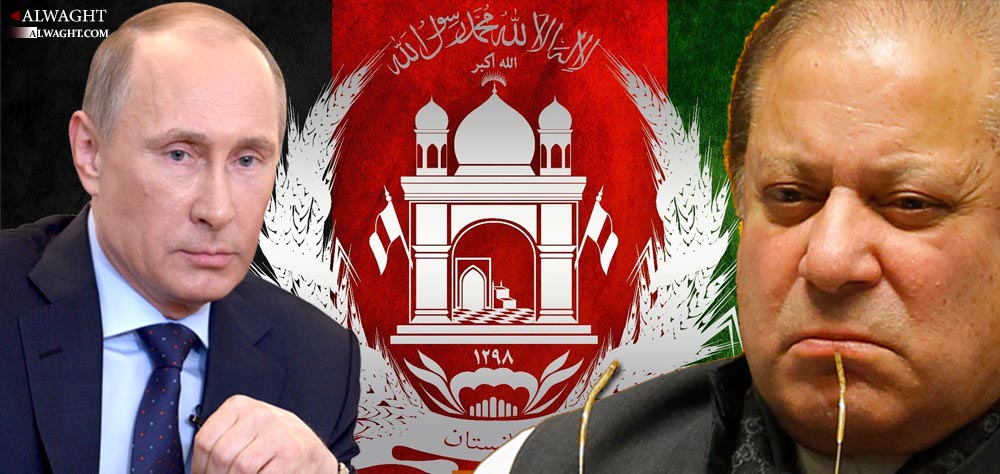Alwaght- The security and political relations in the Central Asia region are witnessing fast-moving transformation these days. India, once standing as a rival of the US, now is showing tendency towards Washington. On the other side, Pakistan is moving away more and more from the US. Islamabad's distancing from Washington has been overt at least at the time of presidency of Barack Obama. Furthermore, Russia and Pakistan, two old rivals, seem to be moving towards cooperative work and mutual security relations. This is well displayed in the joint military exercises held between Pakistan and Russia.
Held in September 2016, the Russia-Pakistan military drills were first to be held between the two countries since the Cold War time. During the Cold War, Pakistan as a Muslim nation stood against the communist Soviet Union, but now this year’s military drills of Moscow with Islamabad signaled a shift in the Kremlin's South Asian policies.
On the other side, the Pakistani will for closer ties with Russia is obviously observable. Islamabad’s relations with Washington are witnessing a chill while Pakistan looks forward to build a new alliance in the region, and it considers Moscow as a partner of the choice for joint work. Last year, the two countries negotiated Pakistan's bid for purchasing Sukhoi fighter jets as well as Mil MI-35 attack helicopters. The talks led to some agreements on the deal.
All these developments can echo only one idea in our mind: Moscow and Islamabad are involved in a process of expanding and deepening their long-term relations. But could these ties with Russia raise Islamabad to become Moscow's top partner both in the region and on the international stage? To put it differently, can from now on Russia occupy place of the US as an ally for Pakistan?
We cannot simply restrict answering to this question to a couple of regional factors. In general, several grounds and conditions are effective in rise of deep and strategic relations between the countries on the global stage. But as long as these factors are related to regional elements effective in Moscow-Islamabad relations, we should consider a couple of essential hurdles.
Certainly, Taliban militant group is one of the sticking points between Moscow and Islamabad. This factor by itself is enough to build the biggest impediment ahead of deepened and strategic convergence between Islamabad and Moscow. Russia very insistently— and desperately—calls for Pakistan to cut off its supports for the militant group to prepare the ground for the Afghan civil war that poses risks to the whole region of the Central Asia to end. Afghanistan in specific and the Central Asia in general are among the vulnerable areas that were under sway of the former Soviet Union. Actually, stability and security in Central Asia, as a backyard of Russia, is very decisive for Moscow. But there is a problem. For Pakistan, halting backing to Taliban in the Central Asia which runs counter to the Russian-favored stability requires something like a revolution in Pakistan's policy-makers minds.
On the other side, this support for the militant group and the resultant criticism have sent Islamabad into a regional isolation, making Pakistan be subject to persistent blaming from its neighbors including India, Afghanistan, Iran, or even the US and the members of the NATO. This isolation and flooding criticism, however, make up motivation for Pakistan to seek closer ties with Russia. Therefore, it comes as no surprise that Pakistan sees no other way but cautiously improving relations with Russia. In fact, Islamabad is optimistic that through warm relations with Moscow it can shrug off the pressures coming from Washington and other Western sides, and at the same time make more than one ally in the region.
However, the signs are not enough yet to allow us suggest that Russia-Pakistan relations are improved. Although the Pakistani government is building its new ties with Russia, the Russians are taking wary steps towards further closeness to Pakistan. Especially because of their long-term relations with Pakistan’s arch-enemy India, the Russians do not want to draw discontent of New Delhi, the largest buyer of the Russian weapons, including their fighter jets. Actually, the Russian relations with India are deeper in roots than with Pakistan. Historically, India was one of the members of the Non-Aligned Movement (NAM) in Asia that stood by Soviet Union during the Cold War with the West. Even more, in the present time, Russia and India jointly provide Afghanistan's national army with helicopters needed for battling Taliban.
These deep-rooted Russian relations with India as an old partner even pushed the Russian President Vladimir Putin to decline to accept an official invitation to visit Islamabad by the Pakistani Prime Minister Nawaz Sharif in early March 2016, saying that there was no way he could justify such a visit to Pakistan. This Kremlin’s response was actually a clear message from the Russians to tell Islamabad that stumbling blocks still outnumbered the common points between Moscow and Islamabad.
Although the two sides have moved towards setting aside their old hostility, as long as backing Taliban remains a priority for Islamabad, neither Putin nor any other Russian president will risk visiting Pakistan. History stands as a proof for this predication. During the 1990s, a period when Pakistan was supporting the Taliban government in Afghanistan, Russia brought under its cover the anti-Taliban forces in the country.
Therefore, the key to warmer relations of Pakistan with Russia is end of Afghanistan’s domestic war through cutting Islamabad’s support for Taliban. Additionally, presently, the ISIS terrorist group’s threat can push Russia and Pakistan to be more convergent. The terrorist group is recruiting youths from Russia's Central Asian republics, as well as from the Pakistani young people. This common threat makes it easier for the two sides to establish strategic ties with each other. Actually, attaining strategic relations between Islamabad and Moscow is feasible if Pakistan can draw a definite conclusion about Taliban and pick one between the militant group and Kremlin.



























